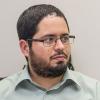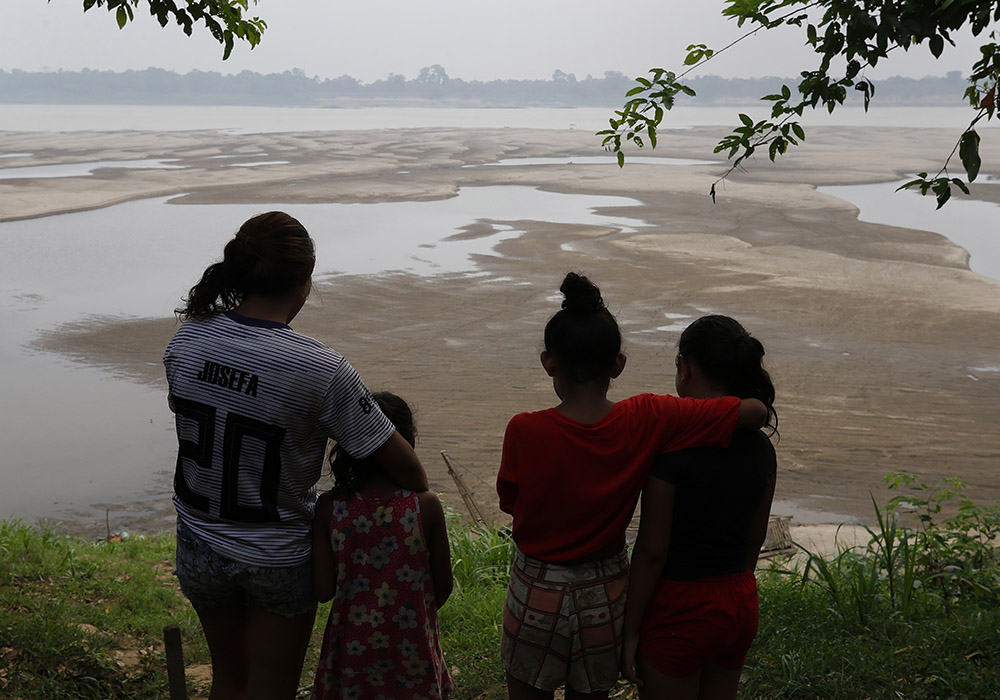
Residents look out at the Madeira River, a tributary of the Amazon River amid a drought in Humaita, Amazonas state, Brazil, Sept. 7, 2024. "Fraternity and Integral Ecology" is the theme of this year's Fraternity Campaign, a Lenten effort by the National Conference of Bishops of Brazil to collect funds for its social works and raise awareness of a pressing issue. (AP photo/Edmar Barros, File)
"Fraternity and Integral Ecology" is the theme of this year's Fraternity Campaign, a Lenten effort by the National Conference of Bishops of Brazil (known by the Portuguese acronym CNBB) to collect funds for its social works and raise awareness of a pressing issue. The idea is to present numerous challenges concerning the environment and ways to overcome them, pointing to a number of emergency transformations on individual and social levels that are necessary to avoid greater catastrophes.
It's not the first year that environmental problems have been selected by the National Conference of Bishops of Brazil as the campaign's subject. In 2025, however, the campaign's documents have an urgent tone, incentivizing churchgoers to make commitments to our common home and undergo ecological conversion.
While church movements and activists work to spread the message to more people, traditionalist Catholic organizations have been campaigning for a boycott, arguing that the funds would finance communist works — an accusation that they have repeated in recent years — and casting doubt on the conference's reasons for promoting integral ecology.
Despite the theological and scientific basis of the central campaign document — a team of 50 doctoral scholars in different fields of knowledge, from theology to biology, took part in the text's drafting and revision — traditionalist groups have also accused it of perverting the meaning of Lent.
"The current heads of CNBB want to substitute the spirit of Lent with a materialist focus on integral ecology, transforming the church into an environmentalist nongovernmental organization," Alvaro Mendes, president of Centro Dom Bosco said on a video disseminated on social media.
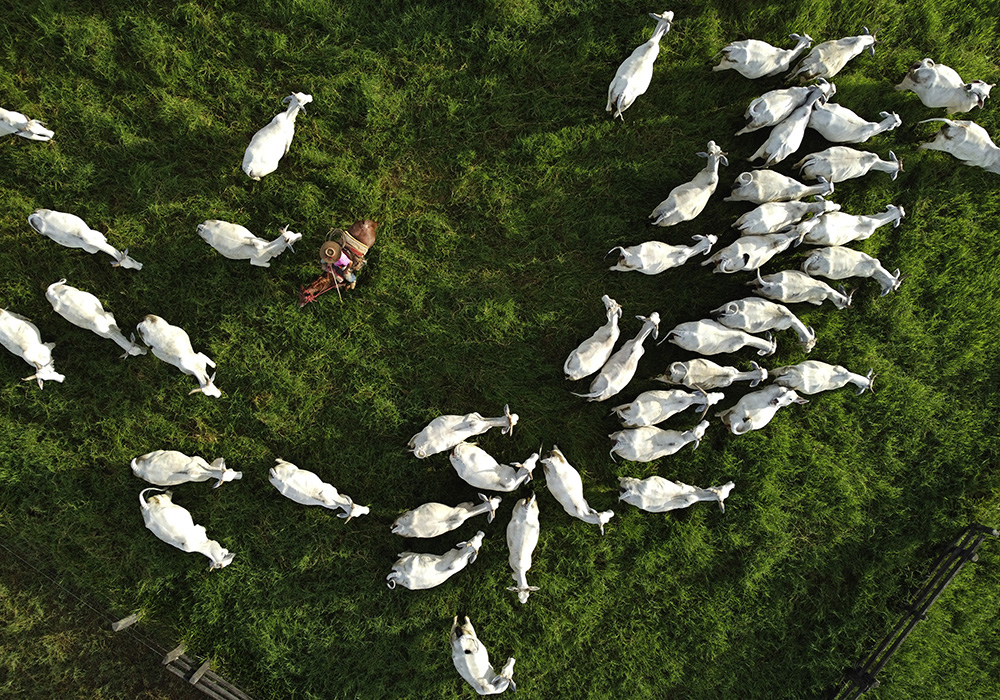
A cowboy sorts cattle in a corral at the Fazenda Itaituba, a farm in the municipality of Bujari, near the city of Rio Branco, Acre state, Brazil, on May 23, 2023. (AP photo/Eraldo Peres)
He called some of the document's contents, such as criticism of cattle ranching, "not fraternal" and said that the "negative sentiments" incentivized by the Fraternity Campaign are inadequate, given that such an economic activity has been sustaining the lives of many Brazilians and producing food for several countries around the globe.
Other entities, like the Plinio Corrêa de Oliveira Institute or IPCO, have also released videos criticizing the Fraternity Campaign.
Sociologist Márcia Maria de Oliveira, a professor at the Federal University of Roraima and an expert in Amazonian social issues, is one of the lay Catholics that wrote the document. A member of Catholic groups and an adviser of several ecclesial organizations — including the Pan-Amazon Ecclesial Network (known by the acronym REPAM) — de Oliveira was one of the Amazonian women invited by Pope Francis to take part in the Amazon synod, in 2019.
"The universities are more and more concerned with climate change and that global system that doesn't respect the limits of nature. The church has been more and more open to science, inviting specialists to contribute with reflections about the necessary interventions," she said.
Climate change denialism, said de Oliveira, is based on shallow ideas and has no acceptance among serious scientists and among conscious Catholics.
"We don't need to be worried about denialism, because it comes from people without any kind of recognition in any field. There are people who just don't want to commit to any change. Our efforts are directed to good-willing people," de Oliveira said.
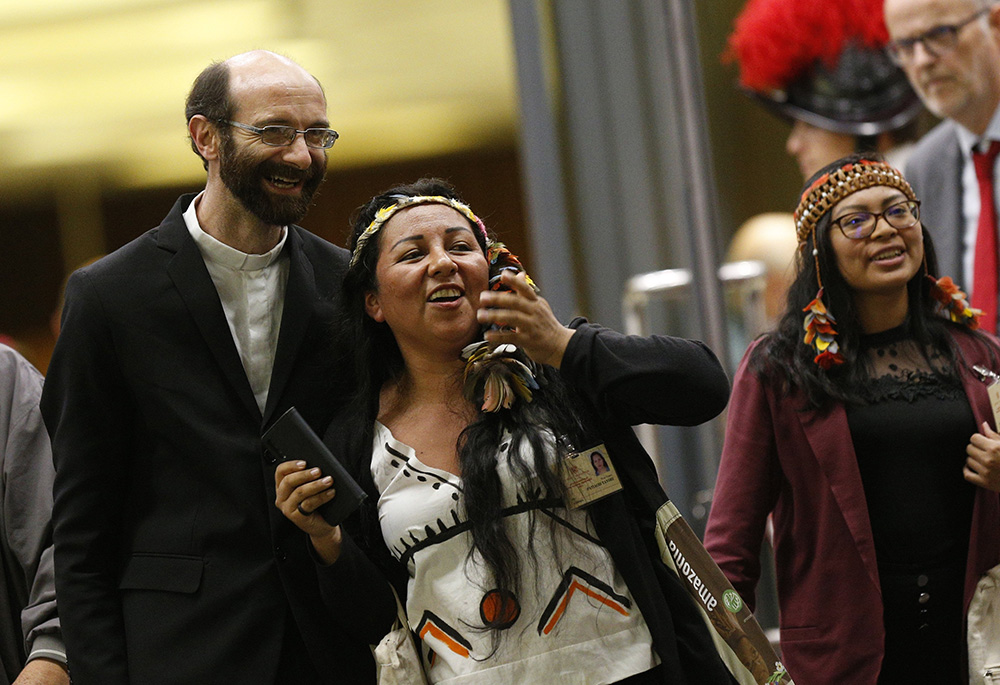
Fr. Dario Bossi, Patiachi Taylor and Leah Rose Casimero leave the final session of the Synod of Bishops for the Amazon at the Vatican Oct. 26, 2019. "If we don't put a break on global warming right now, we'll declare our defeat and get into a cycle of irreparable consequences and crises," Bossi told NCR. (CNS/Paul Haring)
Fr. Dario Bossi, a member of the National Conference of Bishops of Brazil's Special Commission on Mining and Integral Ecology, argued that climate change denialism is generally connected to economic or ideological interests. This campaign targets people who want to know what's happening on the planet and in our societies, especially those who have been feeling discouraged by difficulties posed in the current scenario.
"If we don't put a break on global warming right now, we'll declare our defeat and get into a cycle of irreparable consequences and crises," he said.
The integral ecology theme was suggested two years ago by the mining and integral ecology commission, a group headed by Bishop Vicente de Paula Ferreira and formed by a number of priests in order to monitor the impacts of mining on Indigenous peoples and other traditional populations and to raise awareness of integral ecology.
"This year, it's the 10th anniversary of both the encyclical Laudato Si' and of the foundation of REPAM. We also have to recall the 800 years of St. Francis of Assisi's "Canticle of the Sun," said Fr. Jean Poul Hansen, an CNBB adviser in charge of campaigns. A foundational literary work for Catholic environmentalism, the canticle has been an inspiration for Pope Francis.
2025 is also the year Brazil will host the United Nations Climate Change Conference, COP30, which will happen in Belém, in the Amazonian Pará state, in November.
Church activists, along with Indigenous and peasant leaders, are not hopeful about the conference's outcomes in an era when climate denialism has been growing alongside the populist right wing in countries like the U.S and Argentina.
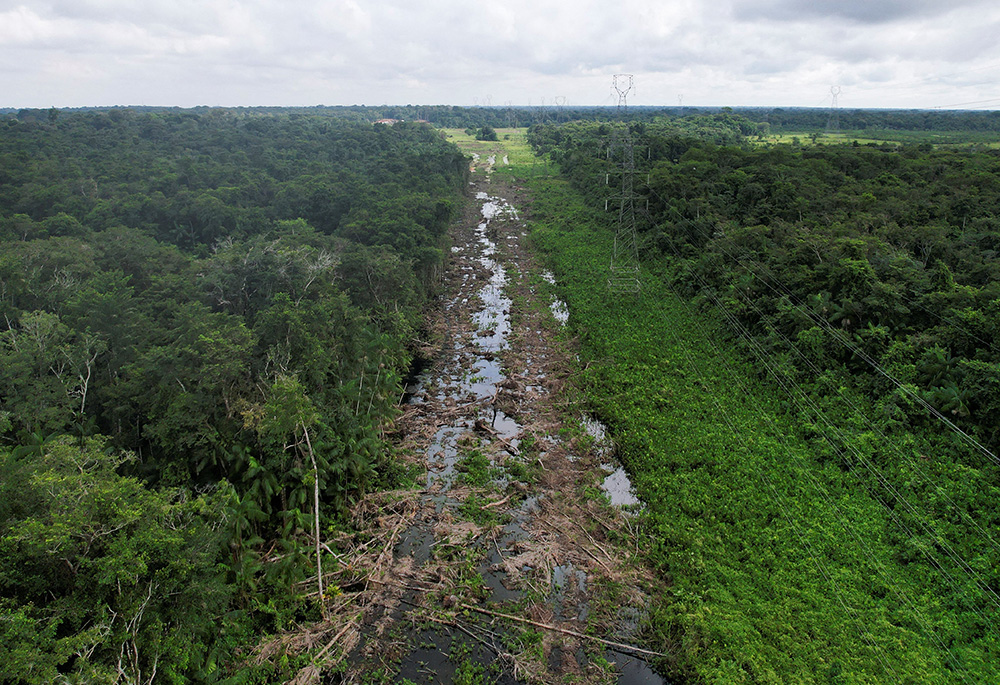
A drone view Feb. 4, 2025, shows the 8-mile-long Avenida Liberdade being constructed through protected rainforest to Belém, Brazil, which will host the United Nations Climate Change Conference (COP30) in November. (OSV News/Reuters/Adriano Machado)
Members of the mining and integral ecology commission have declared on numerous occasions that, unfortunately, themes connected to the carbon credit market will occupy a large part of the encounter.
Ailton Krenak, a major Indigenous leader and an award-winning writer, defined COP30 as a "business counter" in which "corporate managers will negotiate, in a rush, the last sources of natural resources on the planet, almost an auction," during an interview with Terra.
Despite such a pessimistic stance on the conference, Catholic environmentalists have planned numerous actions for the months leading up to the event in November. Forums connecting traditional communities, clergy members and the public will be promoted throughout the year to raise awareness of current climate challenges.
The Fraternity Campaign has been working as a catalyst in that context.
"I've been visiting several parts of the country to train agents. It's been admirable how the people receive the Fraternity Campaign and get excited about it," Hansen said.
Advertisement
The Fraternity Campaign's central text follows the traditional analytical method proposed by the late Belgian Cardinal Joseph Cardijn, founder of the Young Christian Workers: see, judge, act.
It includes a lengthy description of current challenges concerning the environment and society's relations to them. It discusses, for instance, how the Brazilian economy has been dominated by "rapacious exploration" and by land and wealth concentration.
"Nowadays, the major biomes in Brazil — Atlantic forest, the Amazon, Caatinga, Cerrado, Pantanal and Pampa — suffer with successive interventions and modifications," the document reads.
"From a social point of view," it goes on, "land conflicts, invasions of Indigenous and quilombola [communities formed by the descendents of enslaved Africans who fled captivity when slavery was legal in Brazil, between 1500-1888] lands, violence against environmental activists and pastoral agents, among other elements, are an evidence of the deep socio environmental crisis in our country."
The text added that Brazil contributes to climate change through deforestation, agriculture and cattle raising, energy consumption in industrial processes, and the production of residues or garbage. Brazil is a significant generator of greenhouse gases, which trap heat in the atmosphere and raise the temperature of the planet.
The South American country has been already feeling the consequences of such actions, with multiple extreme weather events, including heat waves, extended droughts (especially in the Amazon) and devastating floods, like the one that destroyed a large part of Rio Grande do Sul state in 2024, displacing over a half-million people and leading to losses of billions of dollars.
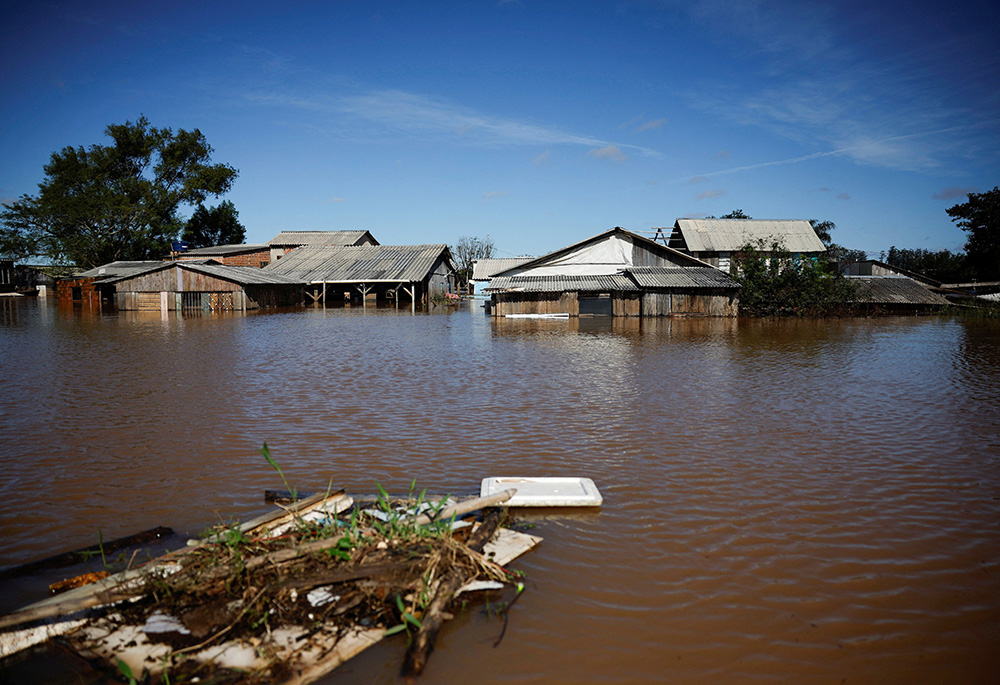
The flooded fishing hamlet of Paqueta in Canoas in Brazil's Rio Grande do Sul state is seen May 14, 2024. (OSV News/Reuters/Adriano Machado)
The document then discusses the need for an ecological conversion, one that is based in the Trinity of God and leads to a life more closely connected to God's creation. It begins with the assumption that humans haven't been in tune with our vocation as guardians of our common home.
Ecological conversion can lead to a revision of our relationships with animals, the preservation of their homes in various biomes, and eating less meat, the text says.
Theological reflections in the document about the meaning of ecological conversion mention excerpts from Scripture, Francis' encyclicals and works authored by church fathers. The text also offers ideas from Indigenous groups.
"Mentions of Indigenous groups used to appear always in the first part, as the suffering people. This time, thanks to Pope Francis' continuous invitation to hear the traditional populations, contributions they give to us about the protection of the common house appear in the part [where] we reflect about the problems," Hansen said.

Davi Kopenawa, pictured in Boa Vista, Brazil, is a Yanomami shaman and spokesman. (CNS/Barbara Fraser)
The text mentions, for instance, the Yanomami leader and writer Davi Kopenawa, who questions the meaning of development in non-Indigenous society, which entails the devastation of the rainforest.
"For us, development is about having a healthy land, allowing our kids to live healthy lives in a place full of life," Kopenawa is mentioned as saying.
The document concludes with extensive lists of recommendations for how to put into practice ecological conversion on personal and community levels.
On a personal level, suggestions include collaborating with church pastoral ministries or civic organizations that work for the protection of the planet and of the poor; adopting a critical lifestyle, far from consumerism; prioritizing sustainable, healthy food; opting for sustainable ways of transportation; reducing waste and unnecessary uses of water; pressuring politicians for measures to favor the environment and the poor; and including in daily life a time for prayer to contemplate our relationships with God and God's creation.
On a community level, many of the recommendations deal with active participation in promoting integral ecology among parishes or other groups. The idea is to include in pastoral activities a reflection about ecological themes and actions that favor environmental protection.
"Integral ecology presupposes a new paradigm for all the ways we built our society and economy: politics, culture, lifestyles, spirituality, individual attitudes. The pope invites us to create a new way of life. It's not only about fixing up something that's not working, it's a real cultural revolution for the Earth and for the poor," Bossi said.
